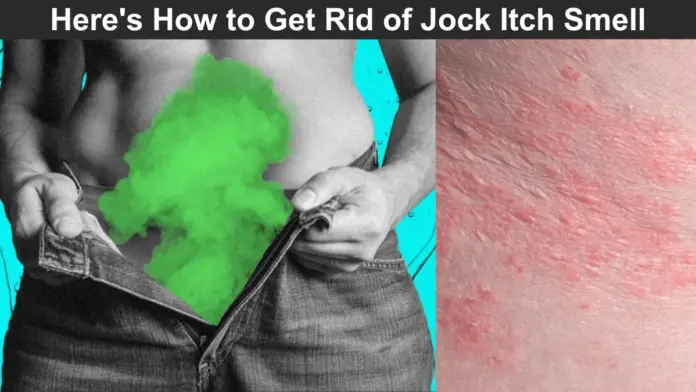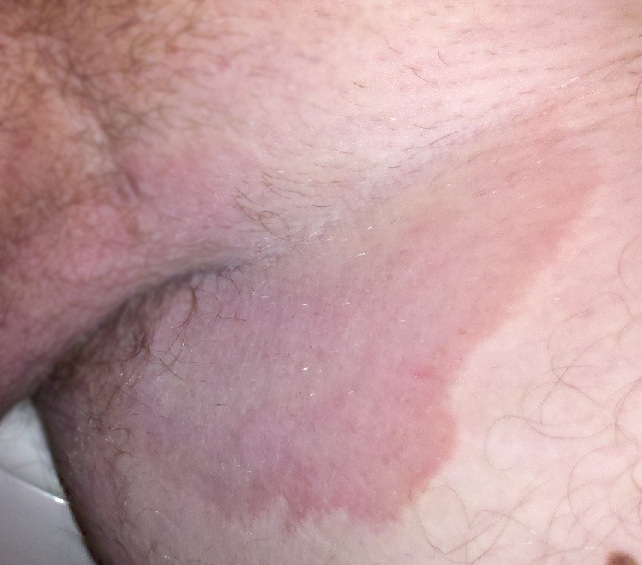
The smell associated with jock itch can affect various aspects of an individual’s life, from their self-esteem to their social interaction. It can cause uneasiness in public settings, deter intimate relationships, and even influence one’s performance in physical activities due to discomfort. Recognizing the significant impact of this seemingly minor health concern, this article aims to provide comprehensive insights on how to get rid of jock itch smell.
Jock itch, also known as tinea cruris, is a common fungal infection that affects the groin and inner thighs. This infection, caused primarily by the Trichophyton rubrum fungus, thrives in warm, moist areas of the body, leading to an uncomfortable rash and an unpleasant smell. The distinct odor can be quite embarrassing, impacting an individual’s confidence and daily interpersonal interactions.
Understanding Jock Itch

Jock itch, medically known as Tinea Cruris, is a skin infection caused by the fungus Trichophyton Rubrum. This condition is more common in men and adolescents, primarily affecting the groin, inner thighs, and buttocks.
The Unpleasant Smell: A Common Symptom
One of the most distressing symptoms of jock itch is the unpleasant smell it produces. This odor is a result of the fungus metabolizing the skin, coupled with the warm, damp environment in which it thrives. Sweat and other body secretions can further contribute to the severity of the smell.
Root Causes of the Smell Related to Jock Itch
Although the primary cause of the smell is the fungal infection itself, other factors can exacerbate the odor. These include:
- Poor Hygiene: Not showering frequently or thoroughly enough can allow the fungus to spread and intensify the smell.
- Overweight: Increased skin folds can create a more favorable environment for the fungus to grow.
- Tight Clothing: Wearing tight underwear or pants can increase sweat and heat in the groin area, promoting fungal growth and odor.
- Pre-existing Skin Conditions: Conditions like psoriasis or eczema can make the skin more susceptible to jock itch and associated smell.
Related Topics:
Proven Methods to Get Rid of Jock Itch Smell
Home Remedies
Home remedies can provide a natural and cost-effective solution to alleviate jock itch odor. Here are some of the most effective remedies:
- Tea Tree Oil: Known for its antifungal properties, tea tree oil can help combat the smell-causing fungus. Mix a few drops with a carrier oil (like coconut or jojoba oil) and apply to the affected area twice daily.
- Apple Cider Vinegar: Dilute apple cider vinegar with water in a 1:1 ratio and apply it to the affected area with a clean cloth. Its natural antifungal and antibacterial properties can help reduce odor.
- Garlic: Garlic’s antifungal properties can help fight jock itch fungus. Crush a few cloves, mix with olive oil, and apply to the area. Remember to test a small area first to ensure no allergic reaction.
Over-The-Counter Treatments
Over-the-counter solutions are a more potent and convenient way to tackle jock itch smell. Some effective options include:
- Antifungal Creams: These are readily available and can effectively treat the fungus causing the smell. Common brands include Lotrimin AF and Lamisil AT.
- Antifungal Powders: These help keep the area dry and treat the fungus simultaneously. Zeasorb and Gold Bond are popular choices.
- Medicated Soaps: Soaps like Defense Soap and Hibiclens can help clean the area and reduce the fungus and odor.
Buy these products on Amazon in discount!
Prescription Treatments
If home remedies and over-the-counter treatments aren’t successful, it may be time to consult a healthcare provider. They can prescribe stronger antifungal medications or antibiotics. Possible treatments include:
- Oral Antifungals: Drugs like Fluconazole or Itraconazole can help to eliminate the fungus from the inside out. Click here to buy.
- Topical Steroids: In some cases, a combination of an antifungal and a steroid may be prescribed to reduce inflammation and treat the fungus.
- Antibiotics: If the jock itch has become infected, antibiotics may be necessary. Always follow your healthcare provider’s instructions when taking these medications.
Remember, while these treatments can help get rid of the jock itch smell, maintaining good hygiene and a healthy lifestyle can aid in prevention.
Preventing Jock Itch Smell
- Lifestyle modifications
- Personal hygiene tips
Lifestyle Modifications
Making changes to your daily routine can significantly impact the prevention of jock itch smell. Here are a few suggestions:
- Diet: Consuming a balanced diet rich in fruits, vegetables, lean protein, and whole grains can improve your overall health and boost your immune system, making you less susceptible to fungal infections.
- Exercise: Regular physical activity promotes healthy circulation which can aid in preventing fungal infections. However, remember to change out of sweaty clothes promptly after exercise to prevent creating a suitable environment for fungus growth.
- Clothing: Wear loose, breathable clothing and underwear made of natural fabrics such as cotton to reduce moisture in the affected area.
Personal Hygiene Tips
Good hygiene can help keep jock itch at bay. Here are some essential hygiene tips:
- Daily Bathing: Shower daily and cleanse the groin area with a mild, fragrance-free soap. Rinse thoroughly to ensure no soap residue is left as it can irritate the skin.
- Dry Properly: After bathing, dry the groin area properly. Use a clean, dry towel and pat the area dry instead of rubbing.
- Change Undergarments: Change your undergarments daily or more often if you sweat a lot. Avoid wearing damp or wet underwear as it can provide an environment conducive for the growth of fungus.
Following these lifestyle modifications and hygiene tips can significantly reduce the risk of jock itch development and the associated smell. Remember, prevention is better than cure!
When to Seek Professional Help
While jock itch is often easily treatable at home, certain circumstances call for professional medical attention. It’s crucial to recognize when your condition may be out of hand, in order to prevent it from escalating into more serious skin complications. Here are some indications that it might be time to consult a dermatologist:
- Persistent symptoms: If the itching, redness, and unpleasant odor persist despite your best efforts at home treatment and lifestyle modifications, it’s time to see a doctor.
- Severe symptoms: Intense itching or pain, and large, spreading red patches are signs of a severe infection that needs professional medical care.
- Frequent recurrence: If you’re experiencing recurring bouts of jock itch despite maintaining good hygiene practices, it could signify an underlying health issue.
- Weakened immune system: Those with weakened immune systems, such as people with HIV/AIDS, diabetes, or those undergoing chemotherapy, should seek immediate medical help at the first sign of jock itch.
Remember, a dermatologist has the training and experience to effectively handle this condition. Don’t hesitate to seek professional help when dealing with persistent or severe jock itch.
Frequently Asked Questions
Q1: What causes the smell associated with jock itch?
A: Jock itch is a fungal infection, and the smell is caused by the overgrowth of these organisms in the warm, moist environment of the groin area. The odor can be worsened by sweat and poor hygiene.
Q2: How can I prevent jock itch smell?
A: Prevention is mostly centered around maintaining good hygiene. Regularly bathing, thoroughly drying the groin area, wearing breathable undergarments, and changing out of wet or sweaty clothes promptly can all help prevent the overgrowth of fungus and subsequent jock itch smell.
Q3: Can over-the-counter treatments help get rid of jock itch smell?
A: Yes, many over-the-counter antifungal creams, powders, and sprays effectively treat jock itch and can help eliminate the associated smell. However, if symptoms persist despite using these products, it is advisable to seek medical attention.
Q4: Is jock itch smell a symptom of a severe infection?
A: While the smell itself is not an indicator of the severity of the infection, persistent smell despite treatment can suggest a more resistant or severe infection and is a signal to seek professional help.
Q5: Can dietary changes help reduce jock itch smell?
A: While no specific diet will cure jock itch, a balanced diet that boosts your immune system can help your body fight off fungal infections more effectively. Consuming foods rich in probiotics can also help maintain a healthy balance of bacteria on your skin and in your body.
Conclusion
In conclusion, managing and eradicating the smell associated with jock itch involves a series of comprehensive steps. Prioritize good hygiene, ensuring you bathe regularly and keep the groin area dry. Opt for breathable undergarments and change out of sweat-soaked clothes promptly. Over-the-counter antifungal products can be quite effective in treating jock itch and eliminating the odor. However, persistence of the smell despite treatment signals the need for medical intervention. Supporting your immune system through a balanced diet and probiotic-rich foods can also aid in combatting fungal infections. It’s essential to be proactive and consistent in these measures to effectively handle the issue. Remember, when it comes to ‘how to get rid of jock itch smell’, prevention is better than cure.











